I've been sober for a year and these are the best non-alcoholic wines that don't make me feel like I'm missing out
The best non-alcoholic wines aren't just for Christmas - you'll want to sip these booze-free options all year round

Stephanie Lowe
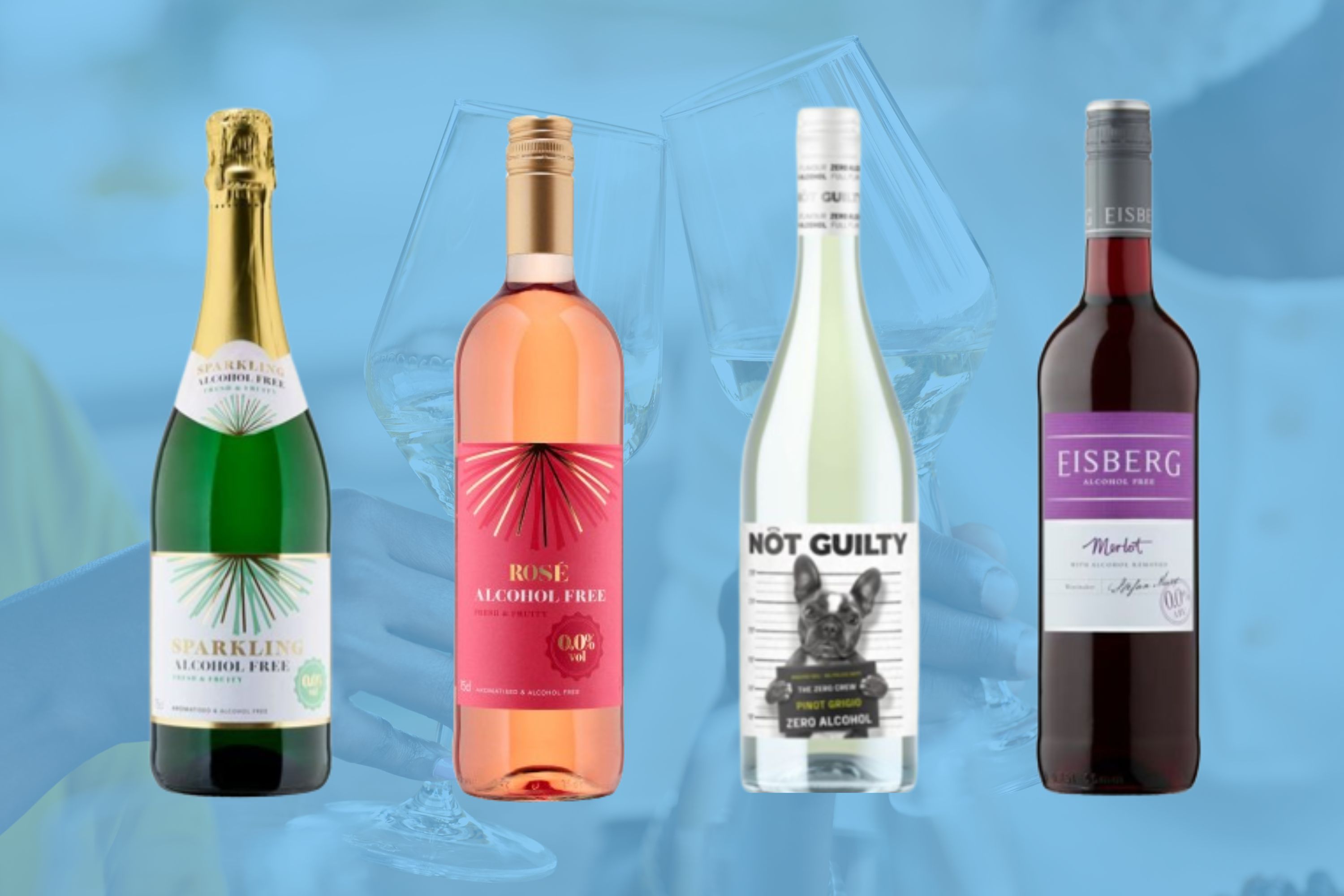
From whites, red and rosé to bubbles and mulled options, we've sampled the best non-alcoholic wines out there - and these are our favourites.
The festive season is almost upon us, and for many of us, that means our weekends are about to be filled with Christmas parties, family gatherings and more seasonal social occasions. Alcohol is a often common denominator in these events, but given the benefits of not drinking - not to mention the effects of alcohol on your skin - it's no surprise that one in seven adults in the UK choose to never drink alcohol, according to Drinkaware. And for the parents among us, giving up alcohol can be a practical life choice too, whether that's because you're breastfeeding or simply because you can't bear the thought of dealing with a toddler when you're hungover.
Laura Willoughby MBE, founder of the world’s largest mindful drinking movement, Club Soda, explains, "Ultimately, we all know alcohol is not great for us. Cutting down won’t do us any harm and finding a nice drink to fill that gap helps with your moderation targets." She adds, "Alcoholic wine is different to other alcohol because it is still, meaning we can drink it quicker, and once a bottle is open it is easy to finish. With a much higher ABV than beer (often near the 15% mark), we can end drunker than we realise. When it’s time to change, many people find wine the most challenging drink to cut down or quit."
But non-alcoholic wine isn't just for those who've decided to give up the booze for good. Sometimes drinking every weekend just isn't practical for a busy parent, which is why you might want to consider trying some low and no options this festive season. We've tested 12 of the best alcoholic wines on offer - including sparkling and mulled options - and rated them by their taste, smell and appearance, so you know which booze-free bottle to take to your next festive gathering.
How we tested the best non-alcoholic wine
We handpicked all of the non-alcoholic wines included in this list and conducted our own taste tests, to make sure every product is one that we would choose to drink ourselves.
Just like we would if we were testing alcoholic wine, we served each of these drinks at their recommended temperatures too, and took into account not only the taste, but the smell, colour and ingredients as well.
And each pick has the seal of approval from Goodto Family Editor, Stephanie Lowe, who's been sober for over a year now. "I'm a mum-of-one and I've been sober for 18 months now. In that time I've nervously navigated big celebrations (Hello 40!), boring social situations and the long old festive period all with the help of alcohol-free drinks," she explains.
Parenting advice, hot topics, best buys and family finance tips delivered straight to your inbox.
"I've tried the majority so you don't have to, read this tried and tested and avoid wasting your money while declaring 'it's just fruit juice really'. Plus, I know it's annoying but even in the world of alcohol-free you get what you pay for, and yes it stings when 0% 'wine' costs the same as 14% wine, but trust me when I say it's worth it."
15 best non-alcoholic wines, tried and tested
Best non-alcoholic red wines
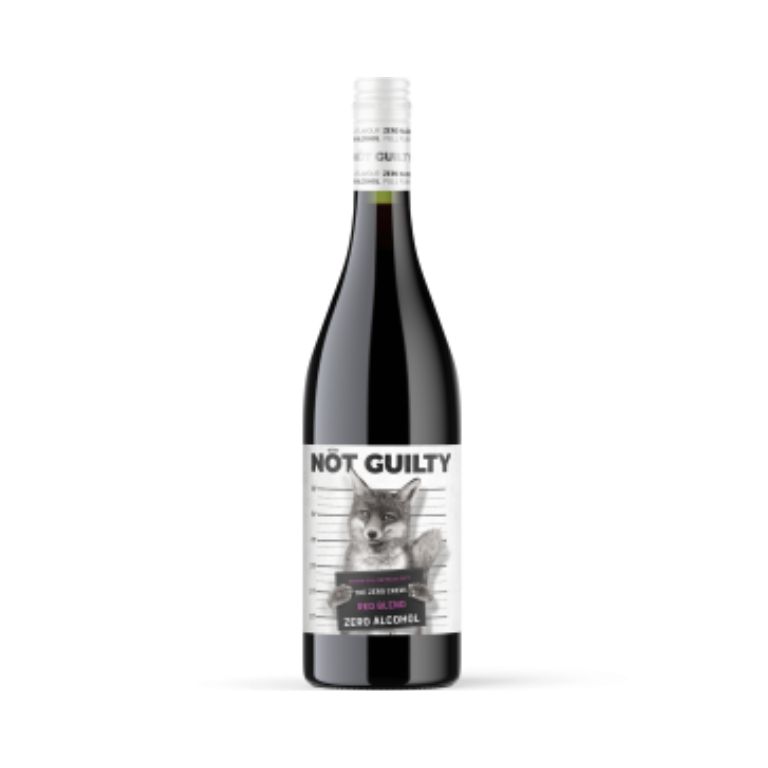
Best non-alcoholic red wine overall
Pair with: Cheeses and charcuterie
Unlike some of the non-alcoholic reds on our list, this drink is a 'red blend', rather than made with specific grape. And thought red wine is notoriously hard to mimic with non-alcoholic options, this full-bodied booze-free option has enough dryness to give it a convincing taste.
Our tester said, "Of all the non-alcoholic wine options, I usually find red the most disappointing, as it usually just tastes like grape juice. However, I was pleasantly surprised by this option. It's still pretty sweet, but you can taste the tannins and it gives you that slight cotton mouth feel of real red wine."
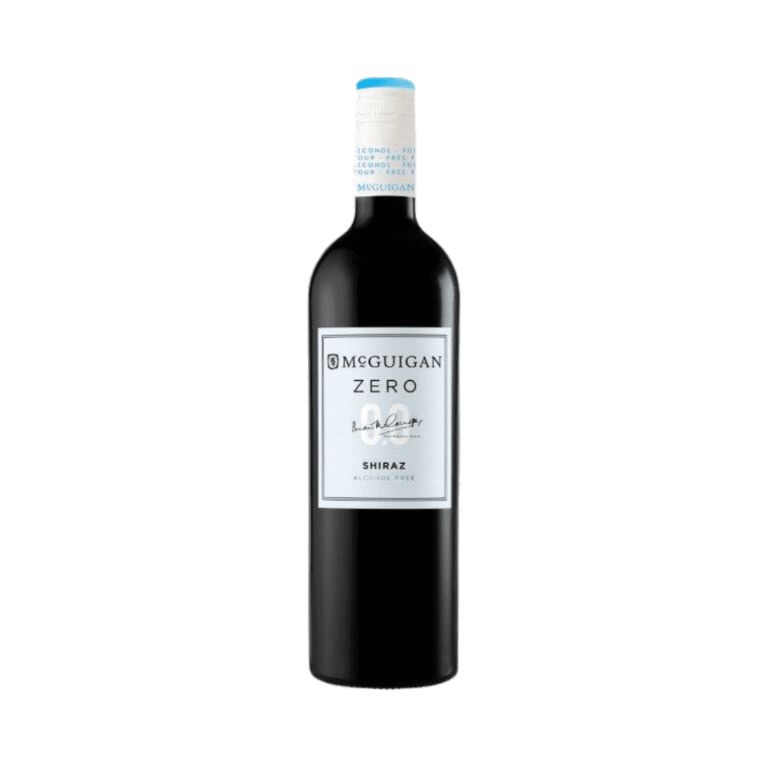
Best sweet red
Pair with: Red meat dishes and pizza
Australian winemakers are perhaps best known for Shiraz, so if there was anyone best placed to make an alcohol-free version it would be Aussie company McGuigan. Their 0% Shiraz is full-flavoured, and our tester gave it a very respectable four and a half stars.
"This non-alcoholic red didn't have the dryness that I liked about its Not Guilty counterpart - it was sweeter and sharper, and definitely felt more like a soft drink - though it was still very tasty."
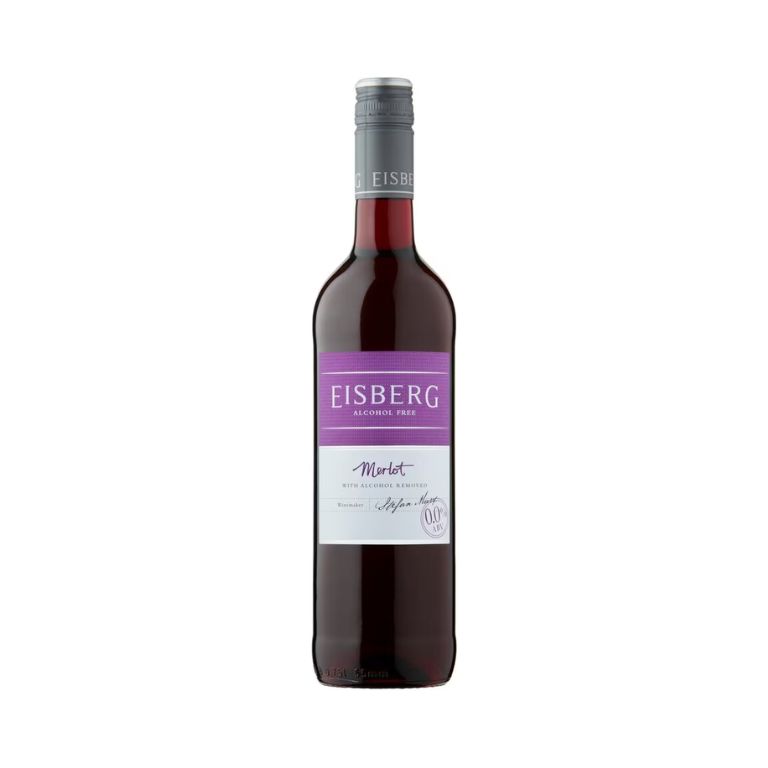
Best dry red
Pair with: Grilled meat
This fruity, aromatic merlot is full-bodied, lush and velvety with intense plum and blackberry flavours. Of all the red we tried, this one smelled the most like 'real' wine, although the scent wasn't as strong as its alcoholic counterparts.
Our tester said, "For those who want to steer away from wines that taste sweet, I'd recommend the Eisberg Merlot. The flavour isn't as strong as some of the other wines I tried, it's much more subtle. At the same time, it lacks the flavour of tannins that the McGuigan and Not Guilty wines have."
Best non-alcoholic white wines
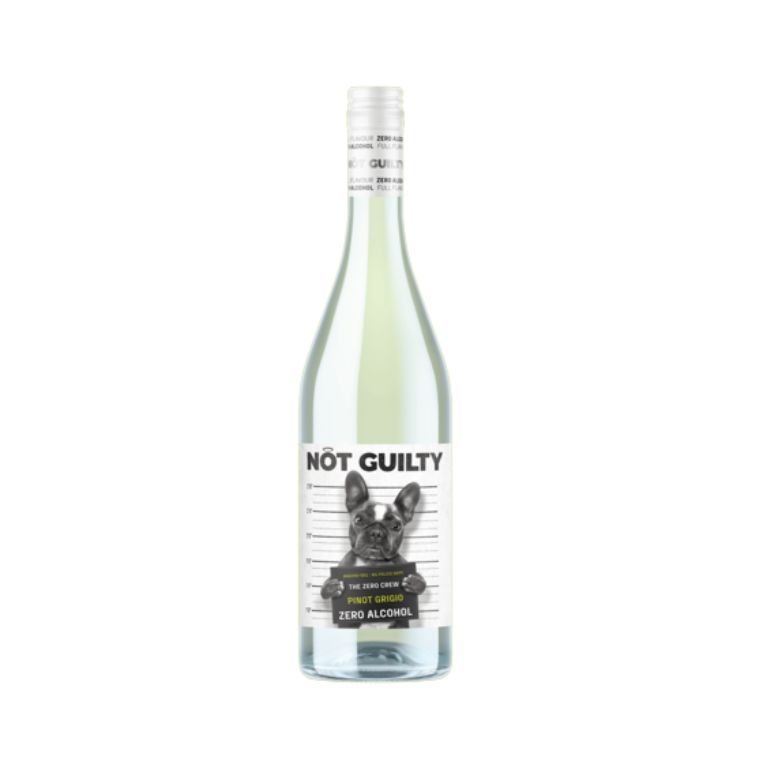
Best non-alcoholic white wine overall
Pair with: Light pasta dishes, salads and chicken
Pinot Grigio is known to be a crisp, dry wine, often with a hint of citrus fruit, and this non-alcoholic version's refreshing fruit flavour is not far off the real thing. Our tester said that of all the whites we tested, this was the most refreshing.
"I can really imagine sipping this white wine at a barbecue or summer party, it's so light and refreshing. It had quite a citrusy flavour, though the fruity flavour wasn't as overpowering as some of the other whites I tried, which was a bonus."
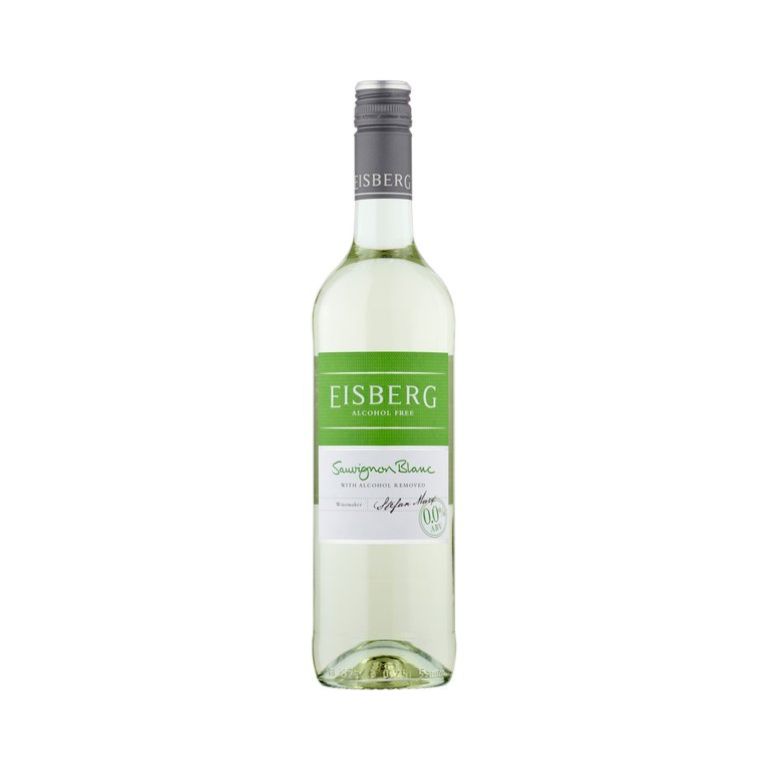
Best non-alcoholic sauvignon blanc
Pair with: Chicken and seafood dishes
Eisberg solely produces alcohol-free wines, so they really are the experts in the field. Using a cutting-edge vacuum distillation system, the complex aroma profile of the wine is maintained, giving this non-alcoholic Sauvignon Blanc its tropical fruit flavour.
It was the palest in colour of the white wines we tested, and also the most floral. "This alcohol-free sauvignon blanc was also very refreshing, and it had a really distinctive sharp smell of gooseberries. Flavour-wise, I could taste hints of honeydew melon and apple, which was very pleasant."
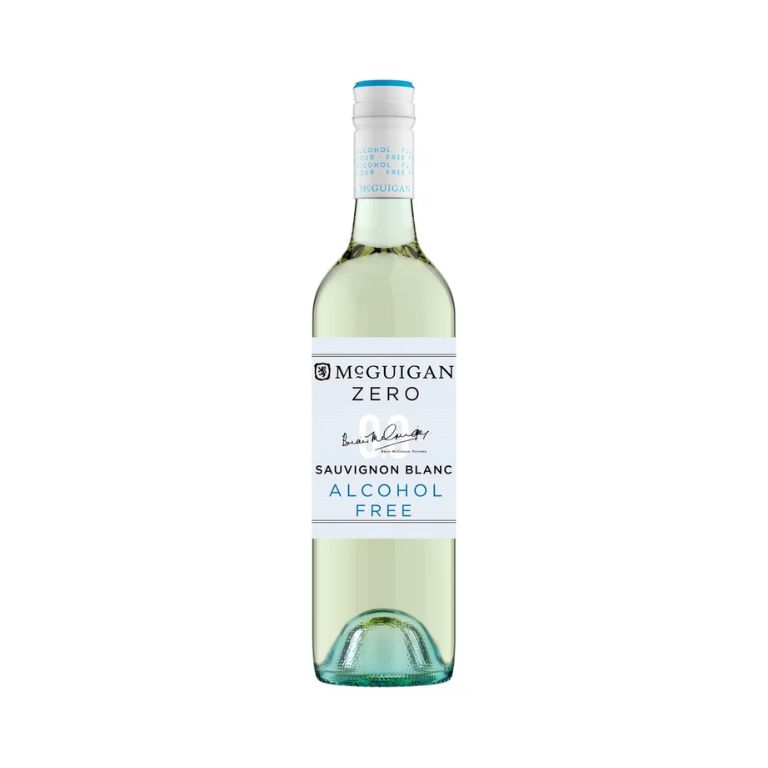
Best steely wine
Pair with: Chicken and light salads
This non-alcoholic offering from McGuigan has generous gooseberry and citrus aromas with passionfruit and lime flavours. It also has a crisp, clean finish and its zesty flavour makes this wine another refreshing option.
Our tester said: "For those who like a steely white wine, I would definitely recommend this sauvignon blanc from McGuigan. It's sharp and has a very heavy zesty flavour, so if you're not a fan of sweet wines then this might be for you."
It's a slightly grassy wine too, which is typical of its alcoholic sauvignon blanc counterparts.
Best non-alcoholic rose wines
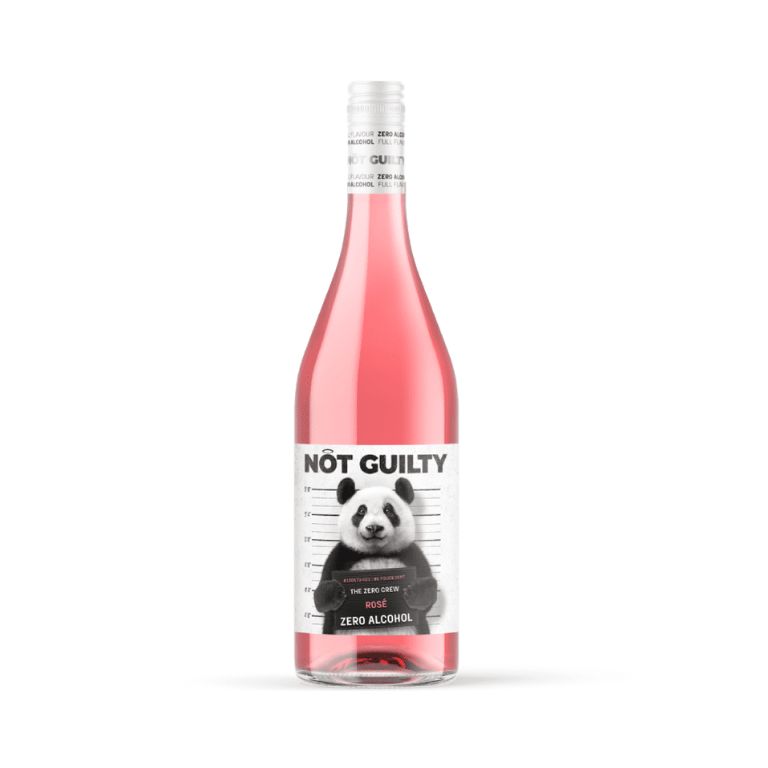
Best non-alcoholic rosé wine overall
Pair with: Duck, rare lamb and white cheeses
Not Guilty have come out on top in our guide to the best non-alcoholic wines, winning the categories for red, white and rosé. Launched by the owner of McGuigan - Australian Vintage - Not Guilty is new to the alcohol-free wine scene but has quickly made an impact.
This rosé provides 'citrus and rose petal aromas, mixed with fresh strawberries', and our tester found it to be a refreshing drink. "I expected this wine to be very sweet given its dark colour, but it was pleasantly refreshing. This was another zesty flavoured wine, and my favourite non-alcoholic rosé."
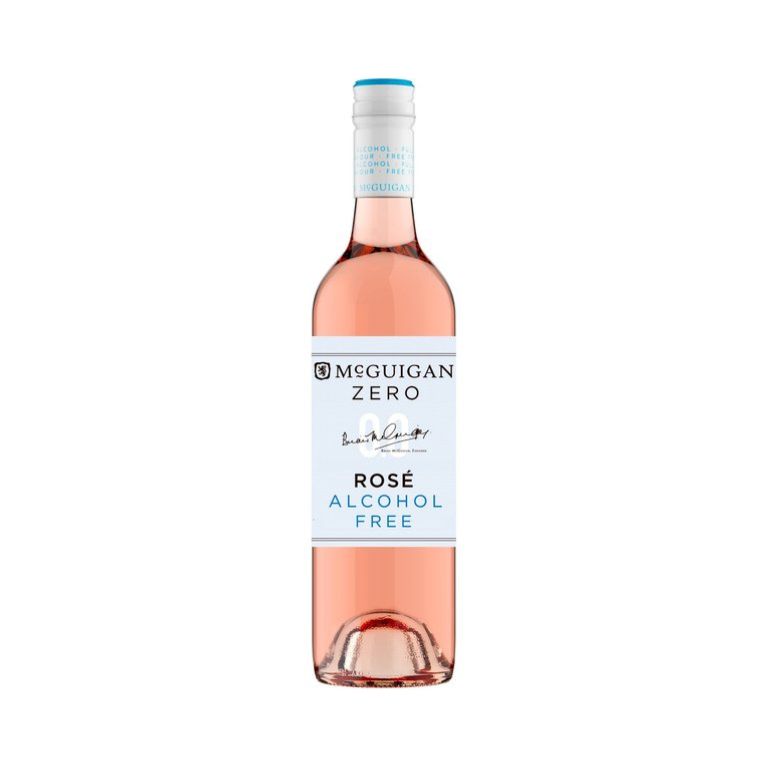
Best dry rosé
Pair with: Salads and fish
Aromatic and vibrant, the scent of garden flowers combine with fresh strawberries and citrus fruits in this non-alcoholic rose wine. It contains no artificial sweeteners or additives, making it doubly good for your health and a truly guilt-free option, and we recommend this particular bottle for fans of a dry rosé.
Our tester said of this alcohol-free bottle, "Crisp and dry, this non-alcoholic rosé really surprised me. It still had that bite you’d expect from a regular rosé, and you can really taste the refreshing berries without the overpowering sweetness. It’s vegan-friendly too, which gets a thumbs-up from me."
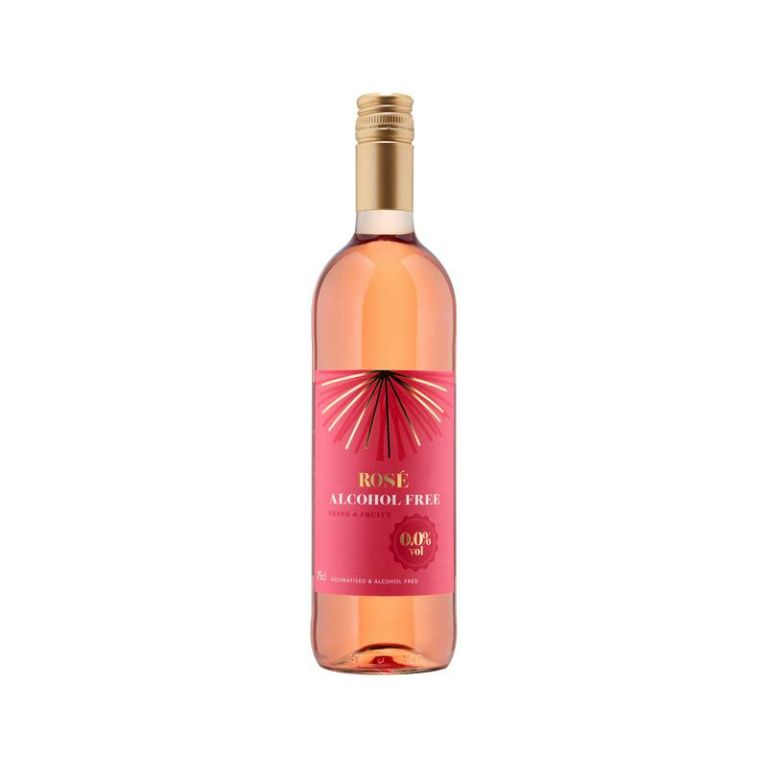
Best sweet rosé
Pair with: Spicy dishes and salads
This sweet non-alcoholic wine is a fresh and fruity drink with summer berry favours. It's paler in colour than the other rosés on our list, and despite its fruity flavour our tester wasn't a fan of the smell.
"This wine had a slightly chemical aroma that I wasn't particularly fond of, but the flavour was good. A very fruit-forward wine from Sainsbury's, there was a definite strawberry flavour to this one."
As a fruitier option, this non-alcoholic wine pairs well with spicy food, but would also go down a treat at a barbecue in the summer months.
Best non-alcoholic sparkling wines
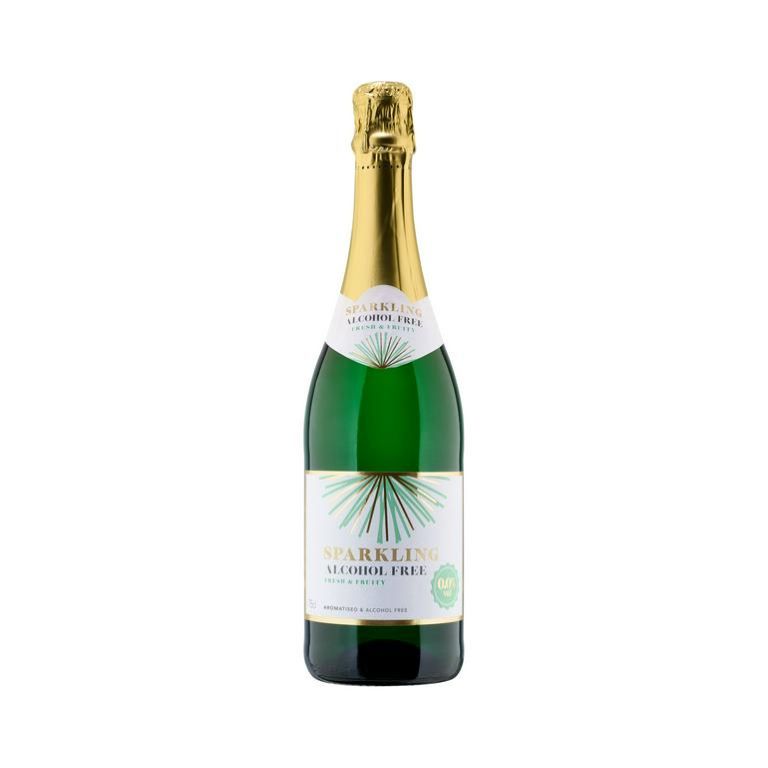
Best non-alcoholic sparkling wine
Pair with: Your favourite party nibbles
Perfect for pairing with party nibbles, this alcohol-free sparkling wine is crisp and refreshing with a touch of sweetness. For those who prefer not to explain why they aren't drinking, this option looks just like Prosecco when it's in a flute, allowing you to fly under the radar.
Our tester said, "I love this alcohol-free sparkling wine - it’s got a sweetness to it that I really enjoy, and the fact that it’s sparkling makes me feel like it’s a party drink, something out of the norm that makes it feel a bit special." Plus, it’s less than £4 a bottle, making it an absolute winner in our book.
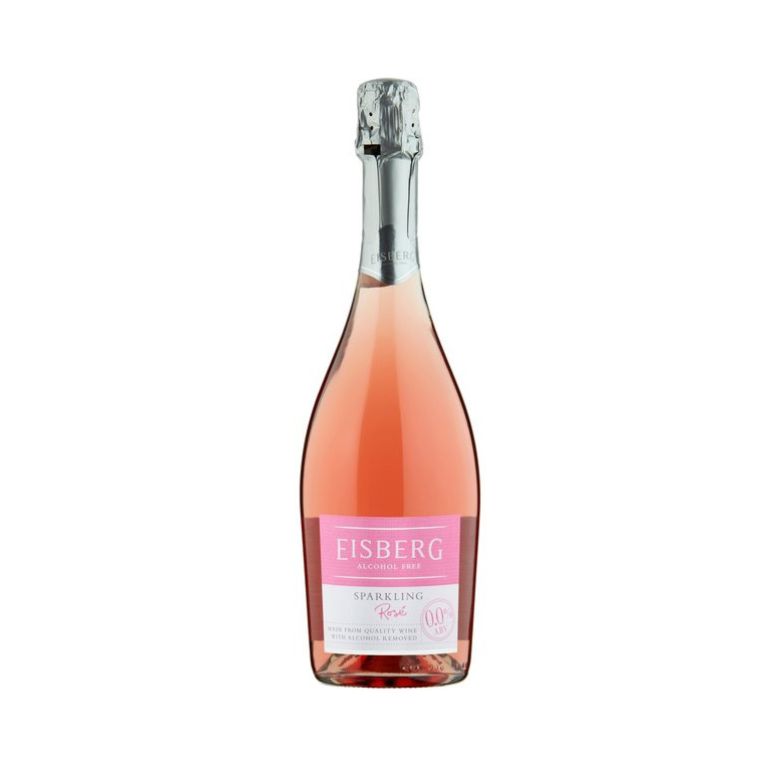
Best non-alcoholic sparkling rosé
Pair with: Afternoon tea
Sparkling rosé is a go-to celebration drink, and now everyone can join in the festivities thanks to this alcohol-free offering from Eisberg. It has a ripe and juicy flavour, bursting with fruity notes of red cherry and strawberry, and it delivers on the bubbliness too.
According to our tester, "This sparkling rosé has a good amount of fizz to it - maybe slightly too much at first, but it soon settles down in the glass. It's fairly sweet in flavour but also slightly tart, and looks a lovely colour in the glass." Save this one in the fridge for your next special occasion, as it's best served at 5-7°C.
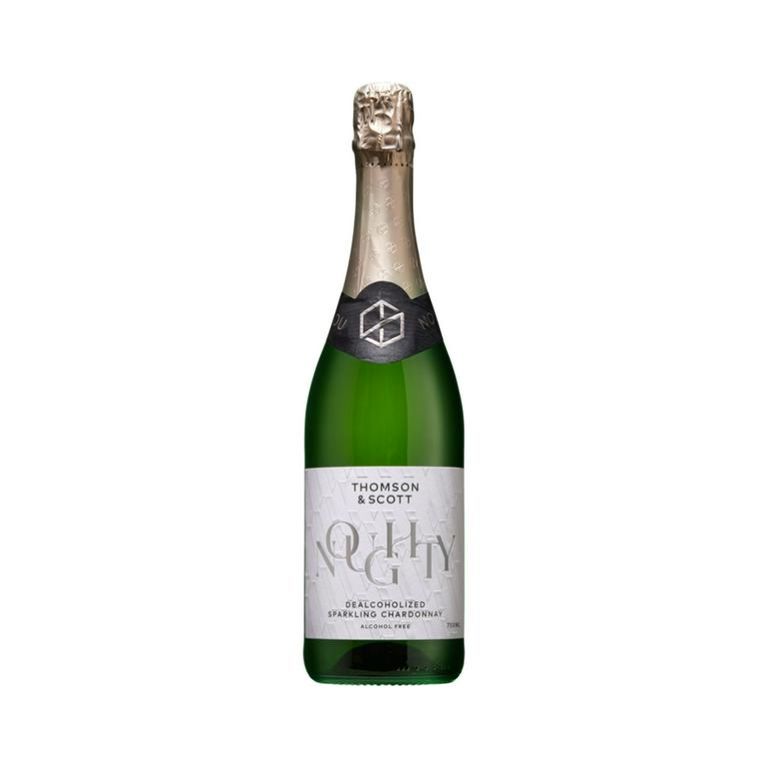
Best quality sparkling wine
Pair with: Appetisers or white meat
This alcohol-free sparkling Chardonnay will certainly make you feel the part at any special festive occasion.
Our tester said, "It’s not as sweet as its budget counterparts, which I much prefer. It also has that dry aftertaste you get with actual wine." At £9 a bottle it's the same price - or sometimes dearer - than actual Prosecco, so this is no budget-friendly option.
Best non-alcoholic mulled wines
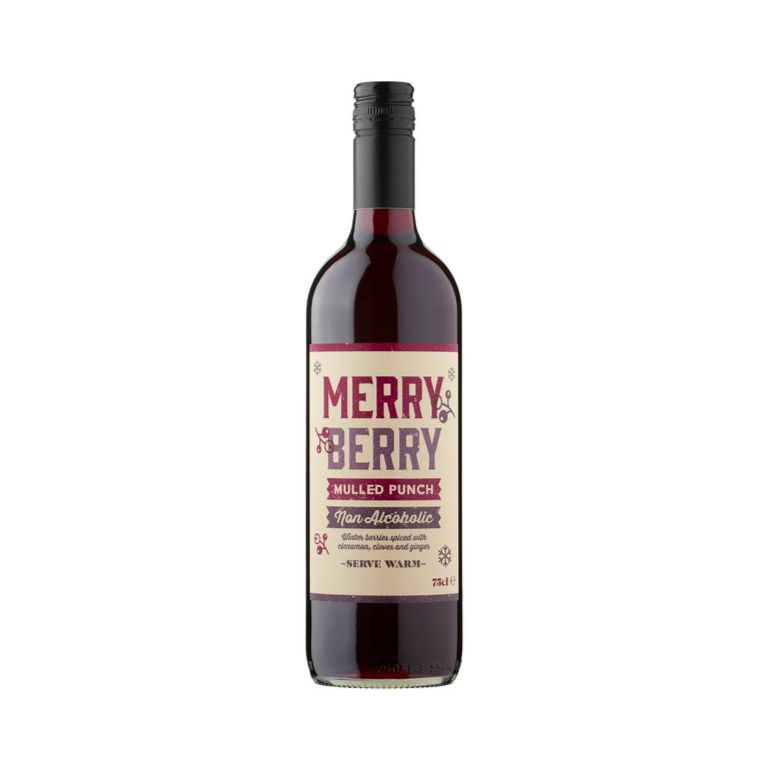
Best non-alcoholic mulled wine
Pair with: Mince pies!
Just because you're not drinking doesn't mean you should miss out on one of the best festive drinks, mulled wine. Fortunately, Sainsbury's is offering this delicious alcohol-free alternative - and at just £2.75 for a bottle, it's an absolute bargain.
Brand new for 2023, this festive drink is flavoured with berries, cinnamon, cloves and ginger. Our tester said, "To me, this tasted a lot like mulled wine. While it lacks the depth of the alcoholic version, it comes very close and has a delicious smell too. I recommend adding some extra spices and a bit of orange peel while heating it up."
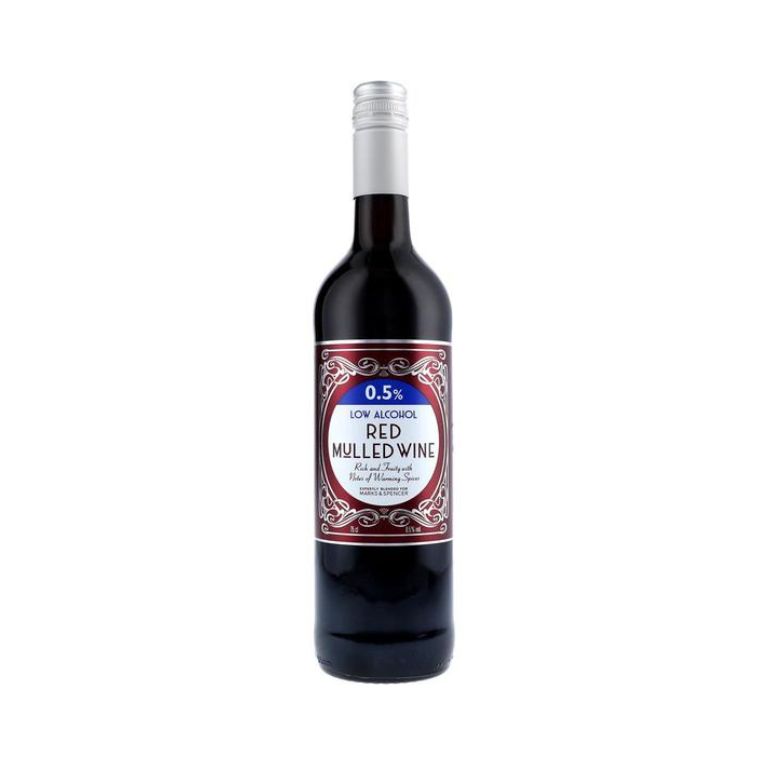
Best sweet mulled wine
Pair with: Mince pies!
Another great option for festive drink lovers, M&S are offering a 0.5% mulled wine this Christmas. Described as "Rich and fruity with notes of warming spice," this one's a sweet option - even for a mulled wine - and reviewers say it's heavy on the clove.
One reviewer on Ocado suggested adding lemon juice to this drink if you want to combat the sweetness, and added that it smells like cinnamon. Another happy customer said, "The best low/non-alcoholic version we've tried and nearest to the real thing."
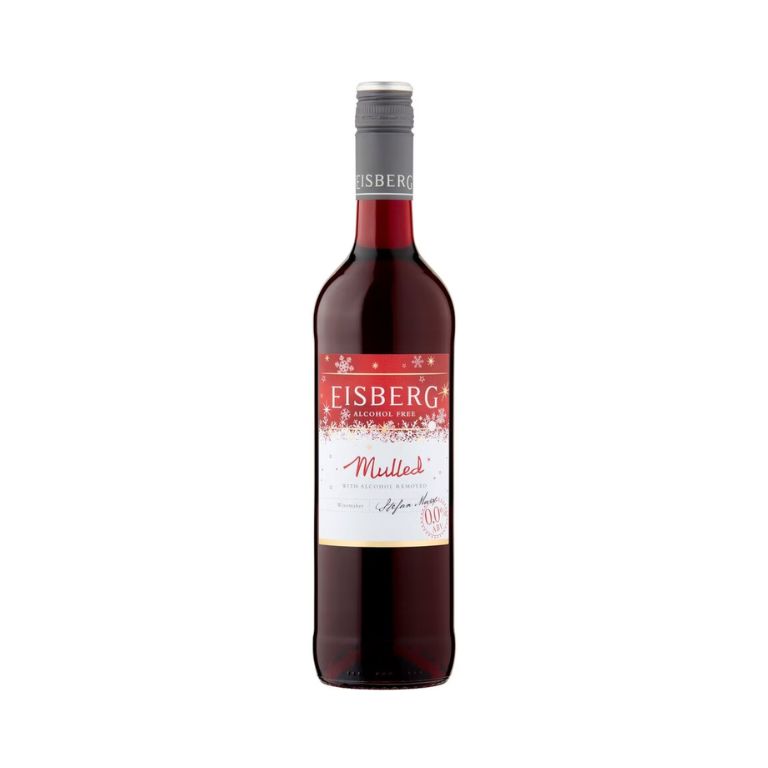
Best spiced non-alcoholic mulled wine
Pair with: More mince pies!
We already know that Eisberg has mastered non-alcoholic wine, earning itself more than one place on this list, and their mulled wine is no exception.
It has intense spice and dried fruit aromas with touches of orange peel, best enjoyed with a cinnamon stick and slice of orange in the glass (and a mince pie on the side, of course).
One Tesco customer gave this alcohol-free option five stars, writing, "It's really good - nice colour, great spices and aroma and not too sweet."
Things to consider when choosing a non-alcoholic wine
- Grape variety: Just like with alcoholic wine, some non-alcoholic alternatives are made using specific kinds of wine grapes. So, if you know that you like the flavour of a particular alcoholic wine, try and find a non-alcoholic alternative that uses the same grape.
- Alcohol by volume (ABV): Even if a drink is labelled alcohol-free, this doesn't necessarily mean it contains 0% alcohol. Some alcohol-free wines have an ABV of up to 0.5%. Meanwhile, 'low alcohol' wines have an ABV of 1.2% or less.
- Pairings: Much like with alcoholic wine, non-alcoholic versions can enhance the dining experience, as opposed to drinking a different soft drink. If you're buying a non-alcoholic wine, think about what you're likely to be eating when you drink it and choose an option that will go well with your meal.
Laura Willoughby, founder of Club Soda, explains, "Wine is generally an occasion drink designed to complement food. What you put in its place does not have to be wine. You can choose between de-alcoholised wines or drinks that are 'wine shaped', have many characteristics of wine, and pair with food but are not 'wine'."
She adds that it can be best not to compare alcoholic and alcohol-free wine, and consider non-alcoholic versions as a drink in its own right. "You will notice the difference because the drink has gone from 15% to 0.5% - that is a lot of alcohol!"
Laura goes on to say, "Alcohol-free wine and wine alternatives are lower in sugar and designed to go with food, and you will notice that it is a much nicer experience than a soft drink and more fun than just sipping on tap water. It’s about the occasion and equality about the serve. No one wants a Coca-Cola from a hose with a nice meal!"
Can you get a hangover from non-alcoholic wine?
No, you can't get a hangover from non-alcoholic wine because it doesn't have the same side effects as alcoholic drinks. For example, alcohol is a diuretic - meaning it makes you more dehydrated - which contributes to hangover symptoms such as thirst, fatigue and headache.
However, there is limited research that suggests sulfites may contribute to wine headaches, and these compounds are also present in non-alcoholic wines. For example, one 2019 study published in the European Journal of Clinical Nutrition found that consuming wine with a higher concentration of sulfites was linked to a greater risk of headaches for those with a history of wine-induce headaches.
Meanwhile, tannins are also present in non-alcoholic wines and are thought to trigger migraines in some people - although, again, the research is limited. One scientific review in the Journal of Head and Face Pain suggested that red wines with more tannins are probably worse for triggering migraine attacks.
What counts as non-alcoholic wine?
Non-alcoholic wine is wine that has been dealcoholized through a process of distillation or filtration. Non-alcoholic wine will often still contain small amounts of alcohol, but the quantity is so small that it's considered safe for people who don't drink alcohol.
0.5% ABV (alcohol by volume) is widely considered the threshold for a drink to be classed as alcoholic, which is why you may see many 0.5% wines or beers advertised as alcohol-free.
Drinkaware explains, "Many, although not all, producers follow government guidance that says alcohol-free drinks may contain up to 0.05% ABV (Sometimes these types of drinks might be described as ‘zero alcohol’, or ‘0.0’ too). But because the guidance is voluntary, in practice you might see alcohol-free labelled drinks that are up to 0.5% ABV for sale."
If you're not ready to give up alcohol just yet, but still want to make a positive change to your health, check out these low-calorie alcoholic drinks. Or, if you're wondering if there are any health benefits of alcohol, we've delved into whether gin can be good for you.

Ellie is GoodtoKnow’s Family News Editor and covers all the latest trends in the parenting world - from relationship advice and baby names to wellbeing and self-care ideas for busy mums. Ellie is also an NCTJ-qualified journalist and has a distinction in MA Magazine Journalism from Nottingham Trent University and a first-class degree in Journalism from Cardiff University. Previously, Ellie has worked with BBC Good Food, The Big Issue, and the Nottingham Post, as well as freelancing as an arts and entertainment writer alongside her studies. When she’s not got her nose in a book, you’ll probably find Ellie jogging around her local park, indulging in an insta-worthy restaurant, or watching Netflix’s newest true crime documentary.
- Stephanie LoweFamily Editor